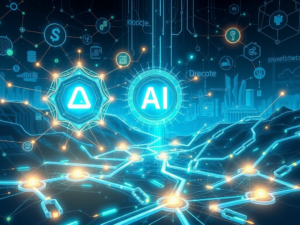The convergence of artificial intelligence (AI) and blockchain technology is reshaping digital infrastructure across industries. While blockchain ensures data immutability, transparency, and decentralization, AI brings predictive intelligence, automation, and pattern recognition. Together, they enable smarter, more secure decentralized applications (dApps), especially in areas like fraud detection, autonomous finance, and smart contract optimization. This synergy is increasingly being adopted by enterprises seeking to enhance operational efficiency and trust in data-driven systems.
AI for Smart Contract Optimization and Automation
Smart contracts—self-executing agreements coded on blockchains—are foundational to decentralized finance (DeFi) and enterprise blockchain solutions. However, traditional smart contracts are static and lack adaptability. AI enhances them by enabling dynamic decision-making based on real-time data. For instance, AI models can monitor market conditions or user behavior and trigger contract clauses accordingly. This is particularly useful in insurance, lending, and supply chain finance, where conditions often change rapidly.
Fraud Detection with AI and Blockchain
Fraud remains a persistent challenge in digital ecosystems. AI-powered fraud detection systems analyze behavioral patterns, transaction anomalies, and historical data to flag suspicious activity in real time. When integrated with blockchain, these systems gain an immutable audit trail, making it nearly impossible to tamper with evidence. A 2024 study in the International Journal of Research in Commerce and Management Studies proposed a hybrid AI-blockchain framework that significantly reduced fraud rates across financial and e-commerce platforms.

Predictive Analytics and Autonomous Finance
AI’s predictive capabilities are transforming blockchain-based financial systems. By analyzing on-chain and off-chain data, AI can forecast asset prices, liquidity trends, and user behavior. This enables the creation of autonomous financial agents—smart contracts that adjust interest rates, rebalance portfolios, or execute trades without human intervention. Platforms like Token Metrics and AI Blockchain are already leveraging these capabilities to offer AI-driven investment insights and automated asset management.
Real-World Applications Across Industries
The integration of AI and blockchain is not limited to finance. In healthcare, platforms like BurstIQ use AI to analyze patient data while blockchain ensures secure, consent-based sharing. In supply chains, companies like Bext360 combine AI’s quality assessment tools with blockchain’s traceability to optimize logistics and ensure ethical sourcing. Even in media, firms like Blackbird.AI use AI to detect misinformation and blockchain to verify content authenticity.
Step-by-Step: How Developers Can Integrate AI with Blockchain
For developers and analysts, integrating AI with blockchain involves several key steps:
- Define the use case: Choose a domain like fraud detection, predictive trading, or supply chain optimization.
- Select the blockchain platform: Ethereum, Hyperledger, or Polkadot depending on scalability and consensus needs.
- Develop the AI model: Use Python libraries like TensorFlow or Scikit-learn to train models on relevant datasets.
- Connect AI to smart contracts: Use Web3 libraries (e.g., Web3.py or ethers.js) to trigger contract functions based on AI outputs.
- Test and deploy: Simulate scenarios on testnets before deploying to mainnet. Monitor performance and retrain models as needed.
Challenges and Considerations
Despite the promise, integrating AI with blockchain presents challenges. Data privacy, model transparency, and regulatory compliance are critical concerns. Moreover, ensuring that AI decisions are explainable and auditable on-chain remains a technical hurdle. Developers must also address scalability issues, as both AI and blockchain are resource-intensive technologies. Nonetheless, with the rise of decentralized AI marketplaces and privacy-preserving computation, these challenges are gradually being addressed.




